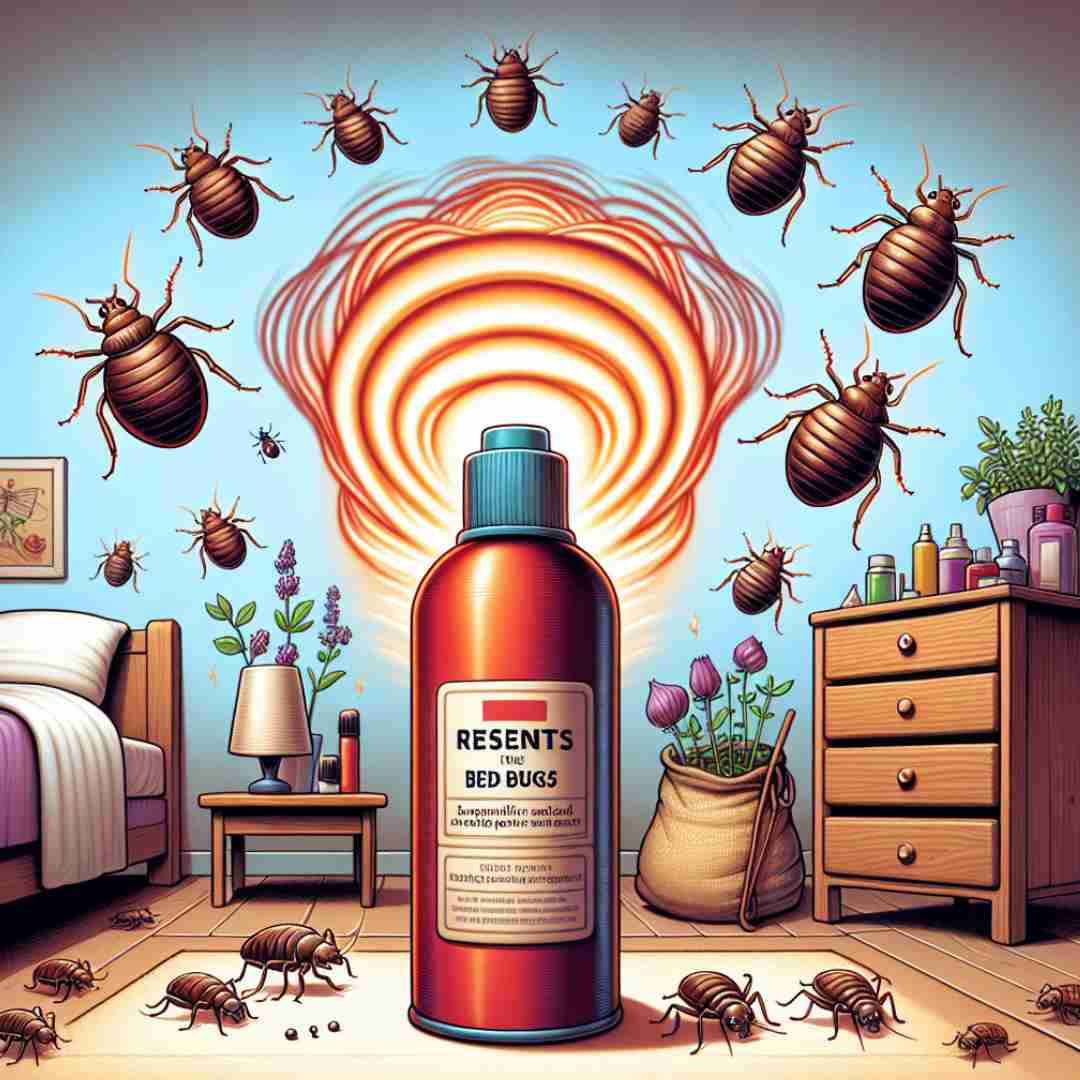Bed bugs are the unwelcome guests nobody wants to host. These tiny intruders create discomfort and frustration, turning peaceful nights into sleepless battles. For those seeking solutions, the good news is that certain scents can deter these pesky creatures. In this guide, we’ll explore the scents that bed bugs are known to despise and how you can use these to your advantage. Whether you’re dealing with an infestation or looking to prevent one, understanding what smells bed bugs hate the most can be a game-changer.
Understanding the Bed Bug’s Sensory World

Bed bugs rely heavily on their sense of smell to find food and mates. This makes them particularly sensitive to certain odors. By exploiting their olfactory vulnerabilities, you can create an environment that they find inhospitable. This approach not only helps in repelling them but also complements other pest control measures you might already be taking.
Like many insects, bed bugs possess a highly developed sense of smell that they use for survival. Their antennae and other sensory organs help them detect chemical environmental cues, guiding them toward potential hosts. This sensitivity can be turned against them by introducing scents they find unpleasant, thereby acting as a natural deterrent.
The use of scent as a deterrent taps into bed bug behavior. Since they instinctively avoid certain smells, introducing them into your living space can make it less attractive to them. This method particularly appeals to those who prefer natural solutions over chemical treatments.
The Power of Essential Oils

Essential oils have gained popularity not only in wellness circles but also in pest control. Certain oils are known for their repellent properties, making them effective against bed bugs. Lavender, tea tree, and peppermint are standout choices, each offering a unique blend of effectiveness and fragrance.
Lavender oil is renowned for its calming properties in aromatherapy, but it also serves as a potent bed bug repellent. The strong scent of lavender disrupts the olfactory signals of bed bugs, making it difficult for them to locate potential hosts. Sprinkling lavender oil around the bed or adding it to a diffuser can help keep these pests at bay.
Tea tree oil is another essential oil with powerful insect-repelling qualities. Its antiseptic properties add an extra layer of protection, making it a double threat to bed bugs. Diluted tea tree oil applied to bedding and furniture creates a barrier that bed bugs will likely avoid.
Peppermint oil is favored for its refreshing scent and versatility. Its intense aroma is unpleasant to bed bugs, driving them away from treated areas. Peppermint oil in spray form allows easy application in targeted spots, maximizing its effectiveness as a repellent.
Harnessing the Pungency of Vinegar

Vinegar, mainly white vinegar, is another odor that bed bugs dislike. Its pungent smell overwhelms these insects, interfering with their ability to communicate and find food. Using vinegar as a cleaning agent or spray can deter bed bugs from making themselves at home.
To leverage vinegar’s power, mix equal parts of water and vinegar in a spray bottle. Apply this solution to potential hiding spots, such as the seams of mattresses and carpets’ edges. This simple yet effective method can serve as a deterrent, reducing the chances of a full-blown infestation.
Vinegar’s versatility extends beyond being a repellent; it’s a great cleaner, too. Regular cleaning with vinegar can help maintain a clean environment less attractive to bed bugs and other pests. At the same time, its scent is strong but dissipates quickly, leaving a fresh and clean space behind.
Citrus Scents as a Natural Repellent

Citrus scents are refreshing to us and repulsive to bed bugs. Lemon and orange oils are particularly effective due to their robust and zesty aroma. Incorporating these scents into your home can create an unappealing environment for bed bugs.
Lemon oil is a popular choice for its bright and uplifting fragrance. When used as a natural repellent, its scent confuses bed bugs, effectively disrupting their communication channels. Adding drops to your cleaning routine can deter bed bugs while enjoying a pleasant aroma.
Orange oil offers similar benefits with a slightly sweeter scent. It’s a versatile addition to natural pest control strategies, repelling bed bugs while adding a fresh scent to your living space. Using orange oil in a diffuser or as part of a homemade spray can enhance its effectiveness.
The Utility of Cedarwood Oil

Cedarwood oil is yet another essential oil that bed bugs find intolerable. Its earthy, woody scent is calming for humans and is a natural insecticide against various pests, including bed bugs. Incorporating cedarwood oil into your pest control routine creates a formidable barrier against these unwelcome intruders.
The active compounds in cedarwood oil disrupt the physiological processes of bed bugs, making it difficult for them to thrive. Applying cedarwood oil in strategic locations like closets and under beds can help prevent infestations while promoting a serene atmosphere.
Cedarwood oil can also be blended with other essential oils to enhance its repellent properties. By experimenting with combinations, you can tailor a scent profile that is both pleasant for you and intolerable for bed bugs, ensuring a peaceful and pest-free environment.
Utilizing Eucalyptus Oil

Eucalyptus oil is a well-known insect repellent with a fresh, invigorating scent. Its high concentration of eucalyptol gives it the power to fend off bed bugs effectively. Incorporating eucalyptus oil into your pest management strategy can provide protection and an aromatic boost to your home.
When used in conjunction with other essential oils, eucalyptus oil can enhance the overall effectiveness of your pest control efforts. Mixing it with carrier oil and applying it to linens and upholstery can create a protective barrier against bed bugs.
Eucalyptus oil’s versatility makes it valuable to your natural pest control arsenal. Whether used in a diffuser or as part of a homemade spray, it offers a refreshing scent while keeping bed bugs at bay, allowing you to enjoy a peaceful living environment.
Cinnamon and Spice for Bed Bug Defense

With its warm and spicy aroma, Cinnamon is not just a kitchen staple; it’s also a natural bed bug deterrent. The strong scent of Cinnamon disrupts bed bugs’ sensory signals, making it difficult for them to locate a host. You can create a cozy, bug-free space by incorporating Cinnamon into your pest control routine.
Using Cinnamon in essential oil or as a sprinkler in areas prone to infestations can enhance your pest control efforts. Its natural properties are a barrier, discouraging bed bugs from settling in. The comforting scent of Cinnamon adds a pleasant touch to your surroundings.
Cinnamon can be paired with other spices, such as clove or nutmeg, to create a fragrant blend that bed bugs find intolerable. This aromatic combination can be used in sachets or sprays, offering a natural and inviting way to keep your home pest-free.
Clove Oil’s Potent Properties

Clove oil, known for its strong, spicy aroma, is another powerful tool in the fight against bed bugs. Its active compound, eugenol, acts as a natural insecticide, making it a practical and eco-friendly option for pest control. By incorporating clove oil into your strategy, you can leverage its potent properties to keep bed bugs at bay.
Applying clove oil to bedding and furniture can create a protective barrier against infestations. Its strong scent confuses bed bugs, deterring them from entering treated areas. This natural approach provides peace of mind while maintaining a pleasant living environment.
Clove oil can be combined with other essential oils, such as lavender or peppermint, for an enhanced effect. This blend amplifies the repellent properties and offers a harmonious scent profile that is relaxing and effective against bed bugs.
Strategic Use of Fresh Herbs

Fresh herbs, such as mint and rosemary, offer a dual benefit of culinary delight and pest control. When strategically placed in your living space, these aromatic herbs can deter bed bugs, creating a natural and fragrant barrier against infestations.
Mint leaves, with their sharp, refreshing scent, are particularly effective at repelling bed bugs. Placing fresh mint leaves near entry points or under mattresses can help keep these pests at bay. This simple yet effective method enhances your home’s aroma while providing protection.
Rosemary, with its earthy and aromatic fragrance, offers similar benefits. Its natural oils disrupt the sensory processes of bed bugs, making it an unwelcome scent for them. You can easily maintain a pest-free environment by using fresh rosemary in sachets or as part of a room spray.
Exploring Neem Oil’s Potential

Neem oil, derived from the seeds of the neem tree, is a well-regarded natural insecticide. Its unique properties make it effective against various pests, including bed bugs. Incorporating neem oil into your pest control regimen can provide a natural and eco-friendly approach to combating infestations.
The active compounds in neem oil interfere with bed bug feeding and breeding cycles, reducing their population over time. Applying neem oil to bedding and furniture creates a barrier that deters these pests while promoting a safe living environment.
Neem oil can be used with other natural repellents for enhanced effectiveness. Its versatility and eco-friendly nature make it a valuable addition to your pest control strategy, allowing you to enjoy a peaceful, pest-free home.
Unleashing the Power of Basil

Basil, renowned for its culinary applications, is also a natural bed bug repellent. The aromatic oils in basil disrupt the sensory processes of bed bugs, making it a practical and pleasant-smelling deterrent. By incorporating basil into your pest control efforts, you can enjoy its fragrance while keeping your home pest-free.
Using basil leaves or essential oil in sachets or sprays can create a protective barrier against infestations. The pleasant aroma of basil adds a fresh touch to your living space while serving as a natural deterrent to bed bugs.
Basil’s versatility extends beyond pest control; it can also enhance the atmosphere of your home. Incorporating basil into your routine creates an inviting, pest-free, harmonious environment.
Conclusion
In the battle against bed bugs, nature provides an array of powerful scents to help keep these pests at bay. By leveraging the natural properties of essential oils, herbs, and other aromatic substances, you can create a home environment that is both pleasant and inhospitable to bed bugs. Knowing what scents bed bugs hate the most, you’re better equipped to protect your space and enjoy peaceful, uninterrupted nights. Explore these natural solutions to enhance your pest control strategy and secure a comfortable, bug-free home.















